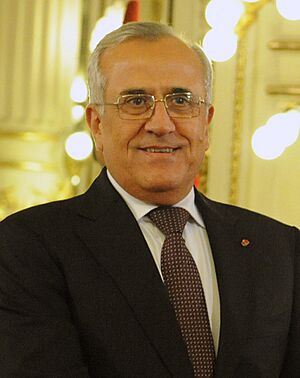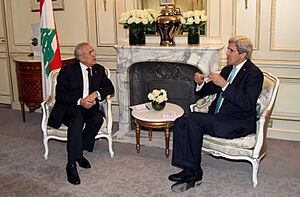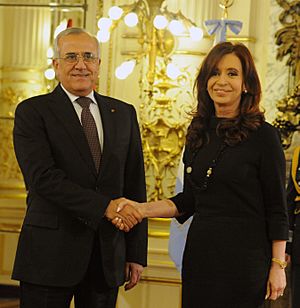Michel Suleiman facts for kids
Quick facts for kids
Michel Suleiman
OM ONC OSC
|
|
|---|---|
| ميشال سليمان | |

Suleiman in 2009
|
|
| 12th President of Lebanon | |
| In office 25 May 2008 – 25 May 2014 |
|
| Prime Minister | Fouad Siniora Saad Hariri Najib Mikati Tammam Salam |
| Preceded by | Émile Lahoud |
| Succeeded by | Michel Aoun (2016) |
| 12th Commander of the Armed Forces | |
| In office 21 December 1998 – 30 August 2008 |
|
| Preceded by | Émile Lahoud |
| Succeeded by | Jean Kahwaji |
| Personal details | |
| Born | 21 November 1948 Amchit, Lebanon |
| Political party | Independent |
| Spouse |
Wafaa Sleiman
(m. 1973) |
| Alma mater | Lebanese Army Military Academy Lebanese University |
| Religion | Maronites |
| Military service | |
| Allegiance | |
| Branch/service | Lebanese Armed Forces |
| Years of service | 1967–2008 |
| Rank | General |
| Commands | 11th Infantry Brigade 6th Infantry Brigade Lebanese Armed Forces |
| Battles/wars | Lebanese Civil War Operation Dinnieh Operation Benin 2006 Lebanon War Operation Nahr el-Bared |
Michel Suleiman (born 21 November 1948) is a Lebanese politician. He served as the 12th President of Lebanon from 2008 to 2014. Before becoming president, he was the commander of the Lebanese Armed Forces (LAF) from 1998 to 2008.
When the previous LAF commander, Émile Lahoud, became president in November 1998, Suleiman took his place. Suleiman was later elected President and started his term on 25 May 2008.
Contents
Early Life and Education
Michel Suleiman was born in Amsheet, Lebanon, on 21 November 1948. His family belonged to the Maronite Christian community.
He joined the Lebanese Armed Forces in 1967. In 1970, he graduated from the military academy as a second lieutenant. He also earned a Bachelor of Arts degree in politics and administrative sciences from the Lebanese University.
During his time in the military, he took part in several training courses. These included an officer course in Lebanon and advanced training in Belgium. He also attended staff courses in France and the United States.
Military Career
Suleiman's military career saw him rise through the ranks. He started as an infantry platoon leader and later became a Battalion Commander. He also worked as a trainer at the Military Academy.
From 1990 to 1991, he was the Chief of the Intelligence Branch of Mount Lebanon. He then served as the Army Staff Secretary-General until 1993. From 1993 to 1996, he commanded the 11th Infantry Brigade. This period involved clashes with Israeli forces in the West Beqaa Valley and South Lebanon.
In 1996, he became commander of the 6th Infantry Brigade. On 21 December 1998, he was appointed commander-in-chief of the Lebanese army. This was a significant promotion, as he was chosen over many more senior officers.
Key Military Operations
In May 2007, the Lebanese Army faced a long conflict with Fatah al-Islam. This group was based in the Nahr al-Bared refugee camp in northern Lebanon. The fighting lasted until September 2007. The Lebanese Army took control of the camp and defeated Fatah al-Islam. Many soldiers, group members, and civilians lost their lives. Suleiman led the army carefully, balancing the safety of civilians and the country's political situation. He had strong support from the public and politicians.
In May 2008, a political crisis in Lebanon led to fighting. Hezbollah and its allies clashed with other political groups. The Lebanese Army, under Suleiman, worked to separate the fighters. They also protected political figures. Some people criticized the army for not directly stopping the fighting. However, others argued that this approach helped keep the army united and prevented a new civil war.
Suleiman's military achievements included:
- Fighting terrorist groups in North Lebanon in 2000.
- Leading the attack on Fatah al-Islam in the Nahr al-Bared refugee camp in 2007.
- Helping to separate protests in 2005.
- Overseeing the army's redeployment after Syrian forces left in 2005.
- Restructuring the Lebanese Army.
- Uncovering an Israeli spying network in 2006.
- Developing a plan to end the 2006 Lebanon War. This plan included deploying the Lebanese Army in the south. This helped restore Lebanese control over the area.
Path to the Presidency
On 23 November 2007, the term of Émile Lahoud, Lebanon's 11th president, ended. At that time, Lebanese politics was very divided. The two main groups, known as 8 March and 14 March, could not agree on a new president. Because of this, the powers of the presidency temporarily went to the government.
Many people were suggested as possible presidents. However, it became clear that only an independent candidate would be accepted by both sides. Michel Suleiman was seen as the best choice to unite the country. He had earned the trust of both political groups, as well as many countries in the Arab region and the West.
His election was delayed by disagreements between the political groups. These issues included forming a national unity government and deciding on election laws. These problems were finally solved during talks in Doha, Qatar, in May 2008. The agreement confirmed that Suleiman would be the chosen candidate for president.
On 25 May 2008, the Lebanese Parliament finally voted. Suleiman was elected with 118 votes out of 127. The Parliament had not met for 18 months due to the political crisis. Many important people from Lebanon, the Arab region, the United Nations, and other countries attended the session.
In his acceptance speech, Suleiman spoke about uniting the country. He said, "We have paid dearly for our national unity. Let us preserve it hand-in-hand." He also urged politicians to focus on the people's hopes, not their own small disputes.
Presidency

On 28 May 2008, President Suleiman reappointed Fouad Siniora as prime minister. Siniora was the choice of the parliamentary majority. Suleiman followed the country's Constitution in making this appointment.
Soon after becoming president, Suleiman asked for posters with his picture to be removed from public places. This was a break from tradition. He thanked citizens and organizations for their support.
Suleiman's main goals as president included:
- Bringing the country together.
- Promoting Lebanon's role in dialogue and cooperation.
- Protecting Lebanon's independence and unity.
- Ensuring security and economic growth.
- Strengthening government institutions.
- Fighting terrorism.
- Following international agreements related to Lebanon.
- Opposing any permanent settlement for Palestinian refugees in Lebanon.
He started a national dialogue at the Presidential Palace in Baabda on 16 September 2008. This was part of the Doha Agreement. It aimed to strengthen national reconciliation.
Suleiman also visited leaders of other countries. He took part in regional and international meetings, including those at the United Nations. This helped to protect Lebanon's rights and interests.
His presidency ended on 25 May 2014. At that time, there was no agreement on who would be the next president. Lebanon remained without a president until Michel Aoun was elected on 31 October 2016.
Personal Life
Michel Suleiman is married to Wafaa Suleiman. They have three children: Rita (born 1975), Lara (born 1978), and Charbel (born 1983). Rita is a dentist, Lara is an architect, and Charbel is a doctor.
His first language is Arabic. He also speaks French and English fluently. He is a Maronite Christian.
Images for kids
See also
 In Spanish: Michel Sleiman para niños
In Spanish: Michel Sleiman para niños
 | Sharif Bey |
 | Hale Woodruff |
 | Richmond Barthé |
 | Purvis Young |



